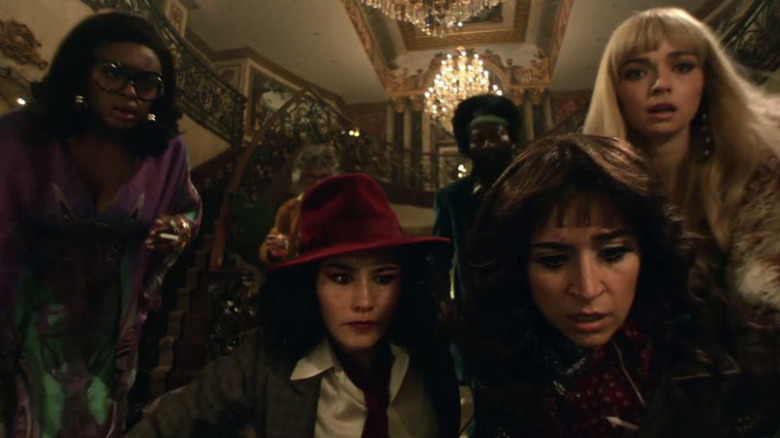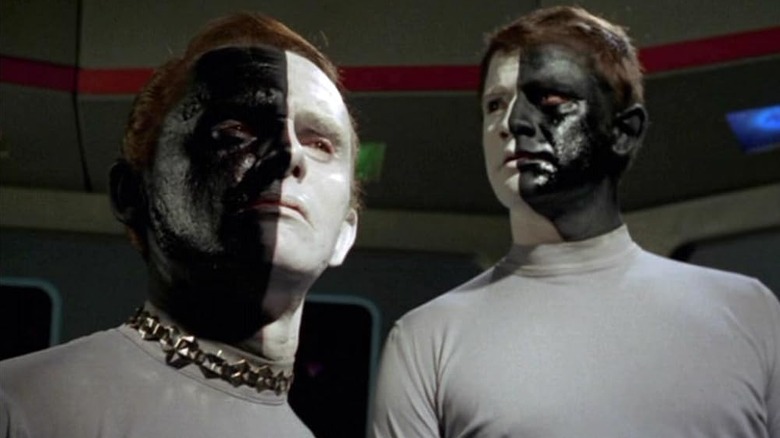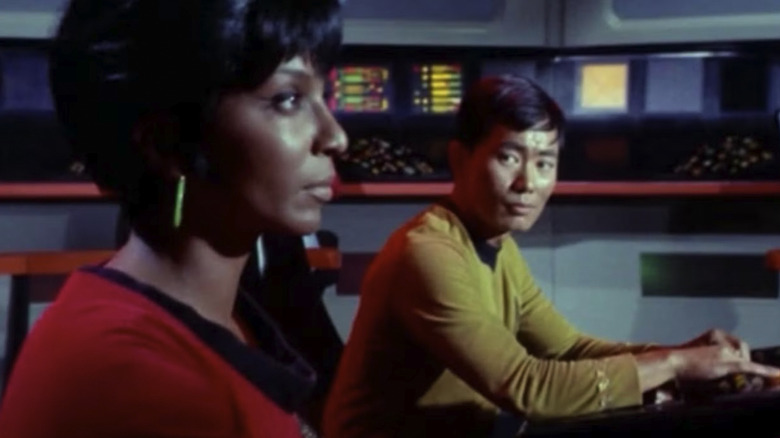Strange New Worlds Season 3's Most Meta Moment Explains Why Star Trek Matters
This article contains spoilers for "Star Trek: Strange New Worlds" season 3, episode 4, "A Space Adventure Hour."
"Star Trek: Strange New Worlds" is set in the 23rd century, so obviously it can't do a holodeck episode, right? Wrong!
"A Space Adventure Hour," directed by franchise veteran Jonathan "Will Riker" Frakes, drops La'an Noonien-Singh (Christina Chong) into a holodeck adventure right out of "The Next Generation." The set-up is that she's testing a prototype of the holodeck and decides to act in a story based on her childhood favorite "Amelia Moon" detective novels. La'an casts herself as Amelia in a mid-20th century Hollywood murder mystery. Tony Hart, the studio head producing a soon-to-be-canceled sci-fi TV series, "The Last Frontier," has been murdered. "Amelia" must find who among the cast and crew of the show (with avatars modeled after the Enterprise crew) is the killer.
If "The Last Frontier" looks familiar, it should! The show-within-a-show is blatantly a stand-in for the original "Star Trek" and the joke is too obvious for it to whoosh over anyone's head like the soaring Enterprise. "A Space Adventure Hour" is an ouroboros: a "Star Trek" episode about "Star Trek." One of the pivotal moments of the episode explores why "The Last Frontier," but really "Star Trek," is more than just, well, an hour-long space adventure series.
Celia Rose Gooding/Uhura plays Joanie Gloss, one of the suspects and a glamorous talent agent repping the "Last Frontier" actors. Joanie first appears to be pretty cynical but it turns out there's an idealist underneath that. When questioned as a suspect, her possible motive is wanting the show to survive. She did want that, but not just because she'd profit from her clients being on a hit series. She explains:
"Canceling 'The Last Frontier' is the stupidest thing Tony has ever done. Do you realize how rare a show like this is? [The creator] wanted to give audiences a digestible version of their own world through the lens of fantasy. Social commentary with rubber masks and buried metaphors, you know, science-fiction ... [The studio was] more ... cautious, didn't want to make waves. The cowards! [He] wanted 'Frontier' to take our rotten world with its warts and injustices and give audiences something better."
Star Trek mixed the pulp and social consciousness of classic science-fiction
"All of that with weekly space adventures?" La'an/Amelia asks, unconvinced. But Joanie continues:
"You don't find the idea inspiring? You don't think some kid out there is going to see this show and spend the rest of their life searching the stars? You don't think a person can love a piece of art or music or a story so much that it heals them, shows them parts of themselves they've never even seen before, gives them hope? A show like this could've gone on forever, given generations of fans a place to feel seen, to belong, something to believe in again, no matter who they were or where they came from. But you can't do any of that without a season 2!"
The words strike a chord in La'an, who is literally living out her childhood fantasies of being a detective like Amelia Moon. If you're a Trekkie, you probably felt the same way about those words, because you know what show Joanie is really talking about: "Star Trek" itself.
The baseline premise that "Star Trek" creator Gene Roddenberry had for the show was a utopian future where mankind left behind greed and social division. In the 1960s, space travel was a symbol of optimism about the future ("Trek" ended in 1969, the same year the U.S. landed on the moon), and "Star Trek" helped cement that part of the decade's legacy. Sure, Starfleet may be adventurers on the final frontier, but they're not out to fulfill an imperialist manifest destiny. They're earnest explorers seeking to broaden their (and our) horizons.
Of course, "Star Trek" can't be credited entirely to Roddenberry. The show's other writers took his premise and used it to explore timely themes like racism ("Let That Be Your Last Battlefield"), the pointlessness of war ("A Taste of Armageddon," the first-ever Klingon episode "Errand of Mercy," etc.), and more.
Unlike "The Last Frontier," "Star Trek" did get a season 2 — and 3 — but no more. Obviously the "Trek" journey didn't end there; we wouldn't have "Strange New Worlds" if "Star Trek" had faded into obscurity. But unlike "Strange New Worlds," the original five-year mission remains incomplete.
Uhura has always been the biggest sign of Star Trek's social impact
The speech in "A Space Adventure Hour" can feel like, and kind of is, "Star Trek" patting itself on its back. But it's earned it, because everything Joanie/Uhura says in that scene is true. "Star Trek" was the beginning of modern fandom and its hallmarks; fanfiction, cosplay, shipping, etc. There's even a fan-created "Star Trek" holiday. As Joanie explains, that fandom is more meaningful than just really loving the show. Marginalized people can find community in sharing art they love, especially historically progressive and accepting art like "Star Trek." /Film's lead editor and Trekkie Jacob Hall has written how "Star Trek" helped him come out of the closet.
The most important meta-touch of the speech is that it's Uhura's actor delivering it. The original "Star Trek" put its money where its mouth was and depicted an integrated cast; the Japanese American George Takei as Mr. Sulu, Walter Koenig as the Russian Chekov, etc. The most daring casting was the late Nichelle Nichols as Uhura, positioning a Black woman as a lieutenant. That was a huge deal for a country that had just outlawed segregation two years prior. Nichols herself often retold how Dr. Martin Luther King Jr. himself encouraged her to keep playing Uhura when she was having doubts about working on "Star Trek."
"I think I said something like, 'Dr. King, I wish I could be out there marching with you.' He said, 'No, no, no. No, you don't understand ... You are marching. You are reflecting what we are fighting for.'"
It actually feels even more meaningful that it's not the original Uhura saying the words in "A Space Adventure Hour." Celia Rose Gooding (who has shared how both Nichols and Zoe Saldaña as Uhura influenced her) is living proof of Uhura's impact on the real world even without delivering a speech about it.
"Star Trek: Strange New Worlds" streams on Paramount+, with new episodes of season 3 releasing on Thursdays.


